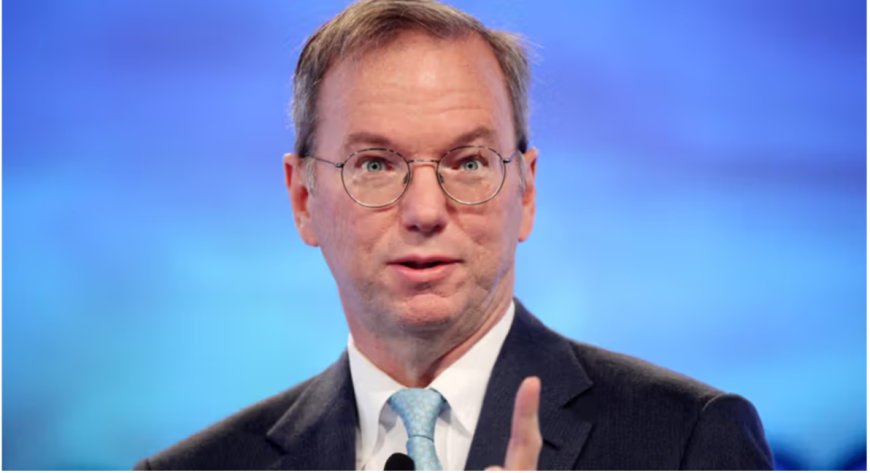Eric Schmidt Warns of AI’s ‘Extreme Risk’: Calls for Oversight Without Stifling Innovation
Former Google CEO Eric Schmidt warns of AI’s “extreme risk,” highlighting potential misuse by rogue states and extremists, while urging balanced oversight to safeguard innovation.

Former Google CEO Eric Schmidt has issued a stark warning about the potential misuse of artificial intelligence (AI), describing it as an “extreme risk” that could lead to catastrophic harm. Speaking to BBC Radio 4’s Today programme, Schmidt cautioned that AI could be weaponized by extremists and rogue states, such as North Korea, Iran, and Russia, to “harm innocent people.”
Schmidt’s comments come amid growing concerns about the rapid advancement of AI technologies and their potential to be exploited for malicious purposes. He highlighted the dangers of AI being used to create biological weapons, among other threats, and emphasized the need for robust oversight to prevent misuse.
The Osama bin Laden Scenario.
Using a chilling analogy, Schmidt referenced the al-Qaeda leader responsible for the 9/11 attacks: “I’m always worried about the Osama bin Laden scenario, where you have some truly evil person who takes over some aspect of our modern life and uses it to harm innocent people.”
He warned that nations or groups with malevolent intent could misuse AI to devastating effect. “Think about North Korea, or Iran, or even Russia, who have some evil goal … they could misuse it and do real harm,” Schmidt said.
Balancing Oversight and Innovation
While calling for governments to closely monitor private tech companies pioneering AI research, Schmidt stressed the importance of avoiding excessive regulation that could stifle innovation. He noted that tech leaders are generally aware of AI’s societal implications but may make decisions based on different values than those of public officials.
“My experience with the tech leaders is that they do have an understanding of the impact they’re having, but they might make a different values judgment than the government would make,” Schmidt explained.
He also endorsed the export controls introduced under former US President Joe Biden last year, which restrict the sale of advanced microchips to slow the progress of geopolitical adversaries in AI research.
Global Divisions on AI Governance.
Schmidt’s remarks were made during his attendance at the AI Action Summit in Paris, a two-day event attended by 57 countries. The summit saw the announcement of an agreement on “inclusive” AI development, signed by major players like China, India, the EU, and the African Union. However, the UK and the US declined to sign the communique, citing a lack of “practical clarity” and failure to address critical national security concerns.
This reluctance reflects diverging approaches to AI governance. While the EU has championed a more restrictive framework prioritizing consumer protections, the US and UK are opting for more agile, innovation-driven strategies.
Schmidt cautioned against excessive regulation, warning that it could hinder progress in this transformative field. “The AI revolution, which is the most important revolution in my opinion since electricity, is not going to be invented in Europe,” he remarked, pointing to the consequences of Europe’s tight regulatory stance.
The Dual-Use Dilemma.
Schmidt’s comments come against a backdrop of increasing scrutiny over AI’s dual-use potential—its ability to be used for both beneficial and harmful purposes. From deepfakes to autonomous weapons, AI poses a myriad of risks if left unchecked.
Leaders and experts, including Schmidt, are advocating for a balanced approach that fosters innovation while addressing these dangers head-on. “Without safeguards, AI’s evolution could have unintended—and potentially catastrophic—consequences,” Schmidt warned.
A Call for Global Cooperation.
While international cooperation remains a complex and contentious issue, the overarching consensus is clear: safeguarding AI’s development is a global responsibility. Schmidt emphasized the need for collaboration between governments, tech companies, and researchers to ensure AI is used for the benefit of humanity.
“AI can be a gift to humanity, but we must make sure that its benefits are widespread and accessible to all,” he said.
Conclusion.
Eric Schmidt’s warning about AI’s “extreme risk” underscores the urgent need for balanced oversight and global cooperation. As AI continues to evolve, the challenge will be to harness its transformative potential while mitigating the risks of misuse.
What’s your take on Schmidt’s warning? Should governments prioritize regulation or innovation in AI development? Share your thoughts below!
 Kinyarwanda
Kinyarwanda
 English
English







































































